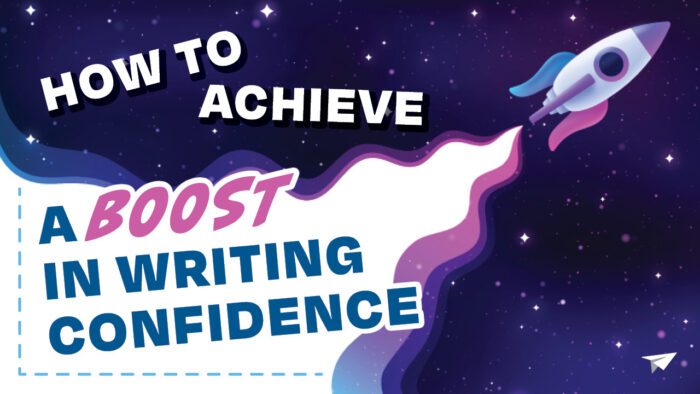Signs Your Writing Confidence Needs a Boost
Writing can be an intimidating task, especially when you’re not sure what you’re doing. It’s easy to get overwhelmed and start doubting yourself as a writer. If you’re feeling like your writing confidence is lacking, there are some tell-tale signs that can help you identify the problem. Knowing the signs that your writing confidence needs a boost can help you take action and improve your writing skills.

You Don’t Use Your Time Efficiently
One of the first signs that your writing confidence needs a boost is if you find yourself struggling to manage your time efficiently when it comes to writing. This could mean that you spend too much time on one task, or that you don’t plan ahead and end up rushing through tasks at the last minute. If this is something that sounds familiar, it could be a sign that your writing confidence needs a boost.
Time management is essential for any successful writer, so it’s important to make sure you have a plan in place for how you will use your time wisely when it comes to writing. Make sure to set aside enough time for research, planning, drafting, editing, and proofreading before submitting any work.
You Worry Too Much About Mistakes
Another sign that your writing confidence needs a boost is if you find yourself worrying too much about making mistakes in your work. While it’s important to strive for perfection in all aspects of life, worrying too much about mistakes can be detrimental to your success as a writer. Instead of focusing on avoiding mistakes, focus on improving the quality of your work by being thorough with research and editing processes.

If you find yourself worrying too much about mistakes, try to take some steps back and remind yourself that mistakes are part of the learning process. Don’t let fear of failure stop you from taking risks or trying new things with your writing – instead embrace them as opportunities for growth and improvement!
You Have Trouble Selling Yourself
If you find yourself struggling to market or promote yourself as a writer, this could be another sign that your writing confidence needs a boost. When it comes to selling yourself as a writer, having confidence in your abilities is key – but if this isn’t something that comes naturally to you then it can be difficult to do effectively.
In order to sell yourself as a writer more confidently, start by focusing on what makes you unique and different from other writers out there – whether it’s specific topics or styles of writing that appeal more to certain audiences than others. Then use this knowledge to create targeted marketing campaigns or pitches that showcase the strengths of your work and highlight why potential clients should choose YOU over someone else!
You Lack Faith in Your Ideas
If you often find yourself doubting or second guessing ideas before they even make it onto paper (or screen), this could be another indication that your writing confidence needs some work. Having faith in the ideas we come up with is essential for any successful writer – without it we won’t have the courage needed to explore our ideas further and develop them into something meaningful or powerful!
To start building faith in your ideas again try brainstorming without judgement – write down whatever comes into mind no matter how silly or outlandish it may seem at first glance! Once all of these ideas are out on paper (or screen) take some time to evaluate them objectively – consider which ones have potential and which ones don’t fit into the overall goal or theme of what you’re trying to achieve with this piece of writing. This will help narrow down which ideas are worth pursuing further!
You Don’t Feel Comfortable Writing About Certain Topics
If there are certain topics or issues related to writing that make you feel uncomfortable or anxious then this could also be an indication that your writing confidence needs some work. Writing about topics we aren’t comfortable with can be intimidating but also necessary if we want our work to remain relevant and engaging for readers! To overcome this obstacle start by researching those topics thoroughly so that when it comes time to actually write about them we feel more prepared and confident in our ability do so effectively!
Also remember not everyone will agree with everything we write – so don’t let fear of criticism hold us back from exploring topics we’re passionate about either! As long as we stay true ourselves while also remaining open minded towards other perspectives then our readers will appreciate our willingness tackle difficult issues head on!
You Can’t Take Constructive Criticism
If constructive criticism has become something dreaded rather than welcomed then this could also be an indication that our writing confidence needs some work. Constructive criticism helps us grow as writers by pointing out areas where improvements can be made – but only if we’re able accept it gracefully without taking offence at every comment made! Learning how take criticism constructively requires practice but once mastered can make all the difference when striving for excellence in our craft!
When receiving constructive criticism try not take everything personally – instead focus on understanding what’s being said objectively before responding accordingly – whether through further explanation or simply thanking them for their input ! Doing so shows maturity while also proving our resilience towards feedback – both qualities highly sought after by employers looking for reliable writers who know how handle constructive criticism well!
You Feel Like a Fraud
Finally if sometimes feel like an imposter among other writers then this could definitely be an indication that our self-confidence needs some boosting! Imposter Syndrome is surprisingly common among writers – especially those just starting out – but luckily there are ways combat these feelings successfully! Start by reminding ourselves why chose pursue this path in first place – whether was because love telling stories through words or simply enjoy challenge each project brings – remembering why started journey begin with will help keep spirits high even during hard times ! Also seek out support from fellow writers who understand struggle better than anyone else ! Talking openly about experience not only allows us vent frustrations but also provides opportunity gain insight from others who have gone through similar struggles themselves !
Signs of lacking writing confidence include inefficient time management , worrying too much about mistakes, difficulty selling oneself, lacking faith in ideas, discomfort writing about certain topics, inability to take constructive criticism, and feeling like a fraud.
You Don’t Use Your Time Efficiently
When it comes to writing, time management is key. Whether you’re writing a blog post, an article, or a book, you need to be able to plan and execute efficiently in order to produce quality work. If you find yourself struggling with deadlines or constantly running out of time before finishing a project, then your writing confidence could use a boost.
Identifying the Problem
The first step in improving your time management skills is to identify the problem areas. Take some time to reflect on how you spend your day and what tasks take up most of your time. Are you spending too much time on research? Do you get distracted by social media or other online distractions? Do you procrastinate until the last minute? Once you have identified where you are wasting time, then it’s time to make a plan of action for improvement.
Creating a Plan
Now that you know where you can improve, it’s time to create a plan for success. Start by setting realistic goals for yourself and breaking down each task into manageable chunks. For example, if you are writing a blog post, set yourself the goal of completing one section per day and break that section down further into smaller tasks such as researching, drafting, editing and proofreading. This will help keep you focused and ensure that everything gets done on schedule.
Sticking to Your Plan
Once your plan is in place, it’s important to stick to it! Set aside specific times during the day when you will be working on your project and try not to let anything distract you from that task at hand. If necessary, set reminders or alarms so that you stay on track throughout the day. Additionally, don’t be afraid to ask for help if needed – sometimes having someone else hold us accountable can make all the difference in staying focused and productive!
By taking these steps towards better managing your time and creating an efficient plan for success, your writing confidence will start to increase as well. With practice and dedication, soon enough your projects will be completed ahead of schedule with ease!
Identify time-wasting areas, set realistic goals, break down tasks, set reminders, ask for help. Improve time management, boost writing confidence, complete projects ahead of schedule.
You Worry Too Much About Mistakes
Writing can be a daunting task, and it is normal to worry about mistakes. However, worrying too much can prevent you from finishing your work on time or even starting in the first place. It is important to remember that mistakes are part of the writing process and that they can be corrected before your work is published.
What Causes Writing Anxiety?
Writing anxiety is caused by a variety of factors, including fear of judgement, perfectionism, lack of confidence in one’s own abilities, and feeling overwhelmed by the amount of work required. Writing anxiety can also be caused by a lack of understanding of the subject matter or difficulty expressing ideas in writing.
Tips to Overcome Writing Anxiety
The best way to overcome writing anxiety is to take small steps and practice. Start by setting realistic goals for yourself and breaking down tasks into manageable chunks. When faced with difficult topics, research them thoroughly so you have a better understanding before you start writing. Additionally, try not to focus too much on perfectionism; instead, focus on completing your work on time and making sure it conveys your message clearly. Finally, if you feel overwhelmed or need help with editing, don’t hesitate to ask for help from friends or colleagues who may have more experience with writing than you do.
You Have Trouble Selling Yourself
When it comes to writing, having the confidence to promote yourself and your work is essential. If you have trouble selling yourself, it can be difficult to get your ideas out there or even just to find the motivation to continue writing. It can be hard to take criticism and use it in a productive way, or to recognize when something you’ve written is actually really good.
Identifying the Problem
One of the signs that you may need a boost in your writing confidence is if you have trouble selling yourself and your work. This could manifest itself in various ways, such as not being able to talk about what you’ve written or feeling like you don’t deserve recognition for your work. It could also mean that you are hesitant to share your work with others because you don’t feel like it’s good enough or that no one would be interested in reading it.
Overcoming the Problem
If you find that you are struggling with selling yourself and your work, there are some things that you can do to start building up your confidence. First, focus on developing an authentic voice for yourself as a writer – this will help make your work stand out from others and give people a reason to read it. Secondly, practice talking about what you write – whether it’s with friends or family members or even strangers online, talking about what you write can help build up your confidence in discussing and promoting your work. Finally, learn how to take constructive criticism in stride – this will help you grow as a writer while also helping build up your confidence in yourself and your abilities.
By taking these steps, you can start boosting your writing confidence and become more comfortable with selling yourself and your work. With practice and dedication, soon enough you will find yourself confidently promoting and sharing what you write with others!
You Lack Faith in Your Ideas
Having faith in your ideas is an essential part of being a confident writer. When you lack faith in your ideas, it can be difficult to move forward and create compelling content. This lack of faith can manifest itself in a variety of ways, including:
Uncertainty About Your Writing Ability
When you don’t have faith in your ideas, it can lead to feelings of self-doubt regarding your writing ability. You may feel like you lack the skills or knowledge necessary to write effectively. This can lead to procrastination and a reluctance to even start the writing process.
Fear of Rejection
Another sign that you lack faith in your ideas is a fear of rejection. If you don’t believe that your ideas are good enough, then it’s natural to worry about how others will respond to them. This fear can prevent you from submitting work for publication or sharing it with others, even if it’s something that you’re proud of and believe in.
Inability to Take Criticism
Finally, when you lack faith in your ideas, it can be difficult to take criticism constructively. Instead of using feedback as an opportunity to improve and refine your work, criticism may be perceived as a personal attack on your abilities and confidence as a writer. This can leave you feeling discouraged and unable to move forward with any kind of meaningful progress on your writing projects.
Overall, having faith in yourself and your ideas is essential for developing writing confidence. Without this belief in yourself, it can be difficult to take risks and put yourself out there with your work. As such, it’s important to find ways to boost this faith and develop a sense of trust in yourself and what you have to offer as a writer.
Lack of faith in ideas leads to self-doubt, fear of rejection, and difficulty taking criticism, all of which can hinder progress as a writer.
You Don’t Feel Comfortable Writing About Certain Topics
It’s natural to feel uncomfortable when writing about certain topics, especially if they are unfamiliar or sensitive. It can be difficult to find the right words and express your thoughts in a way that is respectful and accurate. This can be especially true when writing about topics related to politics, religion, or culture.
Acknowledging Your Fear
The first step to overcoming this fear is to acknowledge it. Recognize that you may feel intimidated by the subject matter and take some time to reflect on why you feel that way. Is it because you don’t have enough information? Are there any biases that might be influencing your opinion? Taking some time to consider these questions can help you gain clarity and confidence in your ability to write about the topic.
Doing Research
Once you’ve identified the source of your discomfort, it’s time to do some research. Read up on the topic and familiarize yourself with different perspectives and opinions. Make sure you understand the nuances of the issue and how it affects different people in different ways. This will give you a better understanding of what you’re writing about so that you can approach it with more confidence.
Seeking Support
Writing can be an intimidating process, especially when tackling unfamiliar topics. If possible, seek out support from friends or colleagues who are knowledgeable about the subject matter or who have experience with similar issues. They can provide valuable insight and help ensure that your writing is accurate and respectful.
Writing From Experience
If possible, try to draw on personal experiences when writing about sensitive topics. Sharing stories from your own life can make the material more relatable for readers while also helping you feel more comfortable expressing yourself through writing.
Overall, having confidence in your writing is essential for producing quality work, regardless of the topic at hand. Acknowledging any fears or anxieties you may have will help you better understand them so that you can move forward with greater ease and assurance when tackling unfamiliar subjects.
You Can’t Take Constructive Criticism
Constructive criticism is an important part of the writing process, as it helps writers to identify and address weaknesses in their work. Unfortunately, some writers have difficulty accepting constructive criticism, which can be a major obstacle to improving their writing.
Why We Struggle with Criticism
The fear of being judged or embarrassed can make it difficult for writers to accept criticism. This fear often stems from low self-esteem or a lack of confidence in our writing abilities. Additionally, receiving criticism can feel like a personal attack on our hard work, causing us to become defensive and resistant to making changes.
How to Accept Criticism
The first step is recognizing that criticism is not a bad thing; it is simply feedback that can help us improve our writing. We should also keep in mind that the person offering the critique is likely trying to help us become better writers.
When we receive criticism, it’s important to remain open-minded and consider the feedback objectively. Instead of getting defensive or taking it personally, try to look at the critique as an opportunity to learn and grow as a writer. It can also be helpful to ask questions about the critique and discuss potential solutions with the criticizer.
Finally, we should remember that even if we don’t agree with all of the feedback we receive, there may still be valuable insight that we can use when revising our work.
You Feel Like a Fraud
When you feel like you don’t have the experience or qualifications to write on certain topics, it can be difficult to gain confidence in your writing. This feeling of being a fraud can be especially pronounced when you’re first starting out and don’t have much of a portfolio to show off.
Identifying Imposter Syndrome
Imposter syndrome is a psychological phenomenon where an individual doubts their accomplishments and has a persistent fear of being exposed as a “fraud”. It’s common among high achievers who are driven to succeed, but feel they are not worthy of their accomplishments. Symptoms include feeling like you don’t belong, comparing yourself to others, and feeling undeserving of praise or recognition.
Overcoming Imposter Syndrome
The good news is that imposter syndrome can be managed and even overcome with the right strategies. Start by recognizing that everyone feels this way sometimes, and that it doesn’t mean there’s something wrong with you or your work. Focus on building skills and gaining knowledge rather than trying to prove your worthiness. Finally, surround yourself with supportive people who will provide encouragement and remind you of your strengths.
Strategies to Boost Your Writing Confidence
Writing can be a powerful tool for communication, self-expression, and creativity. However, many writers struggle with low confidence in their writing ability. To boost your writing confidence, it is important to recognize the signs that you need a boost and then take steps to improve your skills and mindset.
Practice Makes Perfect
The more you practice writing, the more confident you will become in your ability. Take time to write regularly and experiment with different topics and styles. You should also read as much as possible to get ideas for new topics and learn from other writers’ techniques. Additionally, it is helpful to join a writing group or take a class so you can get feedback on your work from experienced writers.
Set Realistic Goals and Celebrate Accomplishments
Having realistic goals for your writing can help keep you motivated and focused on improving your skills. Set achievable goals such as completing a certain number of words each day or finishing a project by a certain date. When you reach these goals, reward yourself with something special like going out for coffee or taking an extra hour off work. Celebrating even small accomplishments can help build up your confidence in your writing abilities.
Get Help When Necessary
If you are feeling overwhelmed by a project or need help understanding grammar rules or formatting conventions, don’t be afraid to ask for help from an experienced writer or editor. Getting outside feedback can give you valuable insight into how others view your work and make it easier to identify areas where you need improvement.
Develop Your Own Style and Voice
Every writer has their own unique style and voice that sets them apart from other writers. Developing your own unique style will help you stand out from the crowd and make it easier to write confidently about any topic. Take time to explore different genres of writing and experiment with different techniques until you find the one that works best for you.
Take Risks and Accept Failure as Part of the Process
Writing is not always easy and mistakes are inevitable at times; however, it is important to remember that failure is part of the learning process. Don’t be afraid to take risks when writing; even if something doesn’t turn out quite right, it could lead to new ideas or better ways of doing things in the future. Taking risks will also help build up your confidence in yourself as a writer because it shows that you are willing to try new things even when they might not work out perfectly every time.
Overall, boosting your writing confidence takes time and practice but it is possible with dedication and hard work. By recognizing signs that your writing needs improvement, setting realistic goals for yourself, getting help when necessary, developing your own style and voice, and taking risks when appropriate, you can become a more confident writer who produces high-quality work consistently over time






